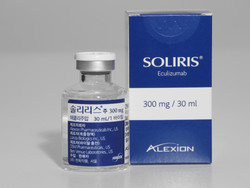Starting April 1, Soliris, a complement C5 inhibitor, will be reimbursed for neuromyelitis optica spectrum disorder (NMOSD), expanding its health insurance coverage beyond paroxysmal nocturnal hemoglobinuria (PNH) and atypical hemolytic uremic syndrome (aHUS).

On Friday, AstraZeneca Korea announced that Soliris (eculizumab) will be included in Korean health insurance coverage for patients diagnosed with NMOSD and who test positive for anti-aquaporin-4 (anti-AQP-4) antibodies, effective April 1.
NMOSD is a rare condition characterized by inflammation of the central nervous system. Its symptoms can be severe, encompassing muscle weakness, urinary difficulties, vision impairment, movement disorders, and even paraplegia. Even a singular recurrence of the disease can result in considerable disability, while repeated relapses may lead to permanent impairments such as blindness and paraplegia.
Moreover, NMOSD exhibits a higher prevalence among females and tends to increase in frequency starting from the 30s. Therefore, active treatment of NMOSD is crucial to mitigate the risk of relapses.
Patients aged 18 years and above with anti-AQP-4 antibody-positive NMOSD are eligible for Soliris if they have an Extended Disability Status Scale (EDSS) score of 7 or less at the initiation of Soliris treatment and meet one of the following criteria:
Have encountered at least two symptomatic relapses within the past year, or at least three relapses within the past two years (including one within the past year), and are eligible for rituximab. They must have undergone treatment for a minimum of three months and either experienced a relapse or cannot continue treatment due to adverse events.
Have undergone treatment with reimbursed satralizumab for a minimum of three months and either experienced a relapse or cannot continue treatment due to adverse events.
Continuation of Soliris treatment is assessed through neurologic function tests conducted every four weeks and EDSS checks performed every six months from the initiation of dosing. It's important to note that NMOSD is the only indication for Soliris where treatment is available without prior authorization.
The reimbursement decision stemmed from the findings of the PREVENT study, which was a randomized, multicenter, double-blind, phase 3 clinical trial. This study confirmed the efficacy of Soliris in preventing relapses among 143 anti-AQP-4 antibody-positive patients aged 18 years and older diagnosed with NMOSD.
During the 48-week treatment period, the study revealed that 98 percent of patients receiving Soliris remained free of relapses, contrasting with 63 percent in the placebo group. This effect persisted throughout the 144-week treatment duration. Furthermore, the annualized relapse rate (ARR) was notably lower at 0.02 in the Soliris group compared to 0.35 in the placebo group.
Although the incidence of upper respiratory tract infections and headaches was higher among patients receiving Soliris, no instances of treatment discontinuation due to adverse events were reported in this group. Conversely, such discontinuations occurred solely in the placebo arm. Importantly, no cases of meningococcal infection were identified throughout the study duration.
"Until a few years ago, NMOSD was an area of significant unmet medical need for both patients and healthcare providers, as there were no licensed therapies available for relapse prevention," stated Kim Chul-woong, Business Unit Director, Rare Disease, at AstraZeneca Korea. "We are delighted to offer treatment options for more Korean patients with NMOSD through the reimbursement of Soliris. With clinical studies demonstrating a remarkable 98 percent relapse prevention rate, we aspire for patients to experience relapse-free lives with Soliris."

